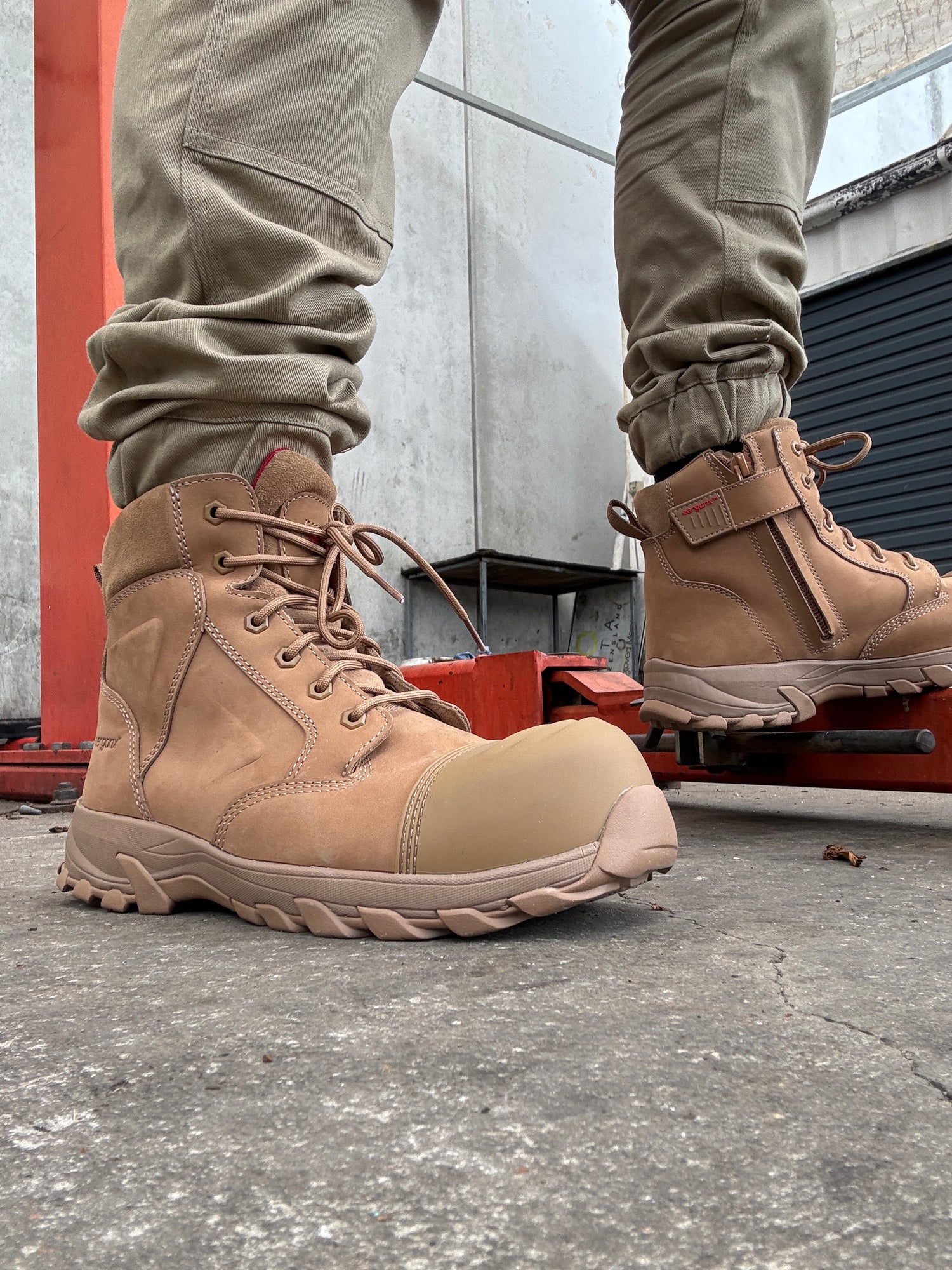Heel pain can be one of the most frustrating and persistent problems for people who spend long hours on their feet. But what if the cause isn’t just the workload—it’s your work boots?
In many cases, worn-out or poorly designed safety boots can actually make your heel pain worse. If you're dealing with plantar fasciitis, heel spurs, or general foot pain, here’s how to tell if your boots are to blame—and what to look for in the right footwear to provide lasting relief.
How Your Work Boots May Be Causing Heel Pain

1. Worn-Out Soles and Poor Flex Points
If your boots are over 6–12 months old, inspect the sole for uneven wear. This can lead to instability in the heel area, aggravating your heel pain and throwing off your foot structure.
Also, check where the boot bends. A proper work boot should bend at the ball of the foot (under the toes), not further back. If the boot flexes in the midfoot or heel zone, it can stress the plantar fascia—a thick ligament that connects your heel bone to your toes—worsening symptoms of plantar fasciitis.
2. Collapsed Arches and Lack of Support
When your feet roll inward (overpronation), the arch flattens, increasing tension on the plantar fascia and Achilles tendon. That strain directly pulls on the heel bone, causing pain, especially first thing in the morning or after sitting for extended periods.
If your work boots allow too much motion through the arch without arch support, they could be contributing to foot fatigue, inflammation, and long-term heel pain.
3. No Arch Support or Cushioning Inside
Good arch support is crucial. Your boots should have a structured insole or custom orthotics to lift the arch and stabilize the entire foot. Without this, you’re more likely to develop or worsen heel spurs, plantar fasciitis, and other painful conditions.
Look inside your work boots. Do they have:
• Firm, structured insoles with a defined arch?
• Cushioning in the heel and forefoot to absorb shock?
• Enough heel height to reduce tension on the Achilles tendon?
If not, it may be time to upgrade to safety boots that do.
4. Tight Calves and Limited Flexibility
Surprisingly, your calf tightness can also cause heel pain. When your calves are tight, they limit your ankle's range of motion and increase the strain on the plantar fascia and Achilles tendon.
If you experience pain at the end of the day or after long hours, it may be due to this imbalance. Regular calf stretches can relieve some of this stress, especially when paired with supportive footwear.
Signs Your Work Boots Need Replacing
• They're over a year old and show visible wear
• They bend in the wrong spot (midfoot instead of the toes)
• The insoles are flat, worn out, or offer poor arch support
• The heel area feels unstable or unprotected
• You notice increasing foot pain, swelling, or discomfort
What to Look for in New Work Boots
Choosing work boots designed with support and pain relief in mind can transform your comfort on the job. Look for these key features:
• Built-in arch support or compatibility with custom orthotics
• Structured heel counter for stability
• Proper toe box with enough room to prevent pressure points
• High-quality insoles that absorb shock
• Durable footwear construction for all-day support
• Materials like moisture wicking socks or linings to reduce heat and sweat
• Designed for your foot shape and specific job site conditions
Bonus tip: If you wear heels off-duty, avoid wearing high heels too often—they can shorten your calves and worsen plantar fascia strain.
Treatment Options Beyond Footwear
If your symptoms persist despite upgrading your work boots, consider these treatment options:
• Custom orthotics prescribed by a healthcare professional
• Regular stretching of the calves, feet, and toes
• Massage or rolling a ball under your arch to release tension
• Ice or heat for swelling and inflammation
• Cortisone injections in more severe cases (as recommended by your doctor)
• Lifestyle adjustments and weight management to reduce body weight on the heel
Final Thoughts
Are Your Work Boots Making Your Heel Pain Worse?
If your work boots aren't giving you the heel support you need, they're not just uncomfortable—they're potentially harmful. Don’t let poor footwear design lead to chronic heel pain, plantar fasciitis, or worse.
Switch to podiatrist-designed safety boots like those from Ergonx, engineered to align your feet, cushion your heels, and give you the relief you need across every shift.
Explore our full range of arch support work boots at ergonx.com.au and take the pressure off your heels today.


